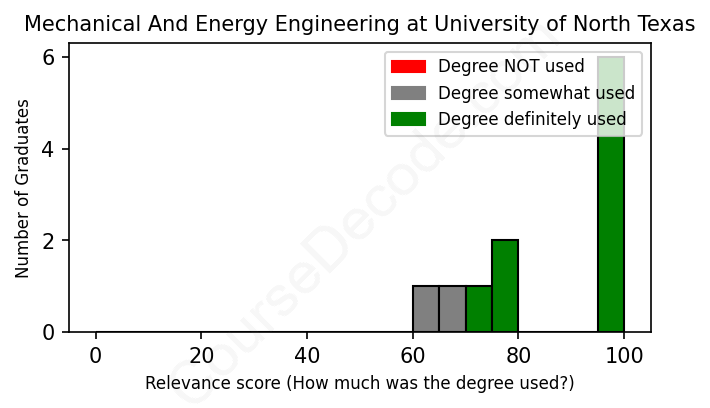
First, some facts. Of the Mechanical And Energy Engineering graduates from University of North Texas we've analyzed , here's how many have used (or NOT used) their degree in their career:

These are estimates based on AI analysis of 11 LinkedIn profiles (see below).
The verdict? Significantly above average. Overall, with an average relevance score of 86%, Mechanical And Energy Engineering graduates from University of North Texas have a much higher likelihood (+19%) of finding work in this field compared to the average graduate across all fields:
And for comparison, here's the chart for all profiles we've looked at across all degrees.
Also, after graduating, only 18% of these graduates have pursued further education other than another Bachelor's degree (such as a Masters degree or other), compared to the average across all profiles of 35%. This suggests a Bachelors degree is enough for most Mechanical And Energy Engineering graduates, and it's normal to look for work straight after graduation.
See the details:
|
Relevance score: 100% We think this person has gone into a career highly relevant to their degree. We think this person has gone into a career highly relevant to their degree.
DEGREE INFOGraduated in 2014 from University of North Texas with a Bachelor's of Science in Mechanical And Energy Engineering. No other secondary education since. JOB HISTORY SINCE GRADUATIONLead Mechanical Design Engineer Safran Sep 2014 - Jun 2022 Senior Mechanical Design Engineer  Peterbilt Motors Company May 2022 - Present ABOUTExperienced Mechanical Design Engineer with a demonstrated history of leading design teams and projects. Able to collaborate and build consensus across multiple organizational levels. Proven track record of identifying, developing, and driving continuous process and cost-efficient improvements. Skills include solid model development using Design for Manufacturing and Assembly (DFMA) and Geometric Dimensioning and Tolerancing (GD&T). |
The top 10 most common jobs done by the graduates we've analyzed (ranked most common to least) are:
Looking at the career paths of those who graduated with a degree in Mechanical and Energy Engineering from the University of North Texas, we can see a strong trend towards technical engineering roles. Many graduates have taken on positions as Mechanical Engineers, Design Engineers, and Manufacturing Engineers, which are all closely tied to their educational background. These roles typically require in-depth knowledge of mechanical systems and energy principles, making them directly relevant. For example, several graduates worked for companies like Baker Hughes and Peterbilt Motors Company, where they were involved in designing and optimizing processes or products—definitely jobs that align with their fields of study.
However, not all positions have been directly related to engineering. Some graduates ventured into sales and project management roles, such as Sales Managers or Key Account Managers, where they might use their technical knowledge in a less hands-on way. While having a background in engineering can provide an advantage in understanding products, these jobs primarily focus on business rather than engineering tasks. Overall, it seems that most graduates are finding jobs that closely relate to Mechanical and Energy Engineering, although there is a notable split where some drift into more administrative or sales-oriented positions that are not strictly engineering-related.
Here is a visual representation of the most common words in job titles for Mechanical And Energy Engineering graduates (this is across all Mechanical And Energy Engineering graduates we've analyzed, not just those who went to University of North Texas):

When looking at the career paths of graduates from the Mechanical and Energy Engineering program at the University of North Texas, it seems like a pretty solid journey for many of them. Most of them kick off their careers in relevant engineering roles right after graduation. For instance, we've got folks jumping into positions like Mechanical Engineer, Manufacturing Engineer, and even roles with companies like Baker Hughes and Peterbilt, which are pretty well-known in the engineering sector. It’s encouraging to see that many of these grads are not only securing jobs right after college but are also progressing into roles with more responsibility over the years.
Fast forward five to ten years after graduation, and many of these graduates have climbed the ladder significantly. They've moved into senior positions, like Lead Engineers and Managers, often remaining in the engineering and manufacturing sectors. While there are a few exceptions where some have shifted to less traditional roles (like project management or even a brief stint as a legal assistant), the majority seem to settle in engineering-focused careers that align well with their degrees. Overall, it's pretty clear that these graduates are finding good opportunities that leverage their education, and many are doing well in their chosen fields!
Honestly, a Bachelor’s degree in Mechanical and Energy Engineering can be pretty challenging, especially if you’re not super into math and physics. At the University of North Texas, you're looking at a mix of strong engineering principles, complex problem-solving, and a good dose of hands-on projects, which can get tough. It’s definitely not the easiest degree out there, as you’ll have to dive deep into concepts like thermodynamics, fluid dynamics, and mechanics, plus tackle some intensive labs and assignments. But if you enjoy these subjects and are willing to put in the work, it can also be really rewarding! Just be prepared for late nights studying and group projects—it’s part of the engineering life!
Most commonly, in the LinkedIn profiles we've looked at, it takes people 5 years to finish a Bachelor degree in Mechanical And Energy Engineering.
Looking at these grads from the University of North Texas, it seems like they’re doing pretty well financially overall! Most of them have snagged solid roles in companies known for decent pay in engineering, like Peterbilt, Baker Hughes, and FedEx. You can see the progression in their careers, starting from entry-level jobs to positions like Senior Mechanical Design Engineer or even U.S. Sales Manager, which typically come with better salaries and benefits. Even the more recent grads are starting off in roles that suggest they’ll be making good money soon. So yeah, if you’re thinking about going into Mechanical and Energy Engineering, it looks like a smart move if you want to earn a good living!
Here is a visual representation of the most common words seen in the "about" section of LinkedIn profiles who have a Bachelor degree in Mechanical And Energy Engineering (this is across all Mechanical And Energy Engineering graduates we've analyzed, not just those who went to University of North Texas). This may or may not be useful:

Here are all colleges offering a Bachelor degree in Mechanical And Energy Engineering (ordered by the average relevance score of their Mechanical And Energy Engineering graduates, best to worst) where we have analyzed at least 10 of their graduates:
| College | Score | Count |
|---|---|---|
 University of North Texas University of North Texas
|
86 | 11 |